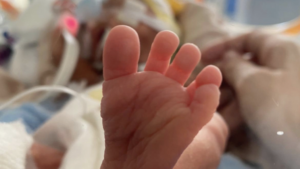When is prenatal surgery advisable and technically possible?
We will discuss with you whether surgery on your unborn child is advisable and/or technically feasible after a special ultrasound examination. If helpful or if you wish, we will also consult obstetricians, specialized pediatricians, and surgeons who will be responsible for the birth and postnatal care of the child.
The goal of all our prenatal procedures is to improve your child’s chances of a normal or largely normal quality of life. We do not always achieve this goal, but fortunately we do in most cases. To this end, we always advise you based on the latest scientific findings and our surgical capabilities. With your consent, we will of course also discuss the findings and the treatment options presented to you with your gynecologist or the prenatal specialist who referred you.
Does prenatal treatment carry any risks?

In principle, every surgical procedure and every drug therapy carries certain risks of complications.
However, bleeding, infections, or drug intolerances are rarely observed (< 3%). Even labor occurring after a procedure is rarely relevant and usually only of short duration. Our prenatal procedures are almost always well tolerated by pregnant women and have no consequences for their health or future pregnancies.
In line with our gentle approach, almost all of our procedures are performed under local anesthesia of the mother’s abdominal and uterine wall or under short general anesthesia. Longer anesthesia (of both mother and child) is therefore only necessary for special operations, such as those on an unborn child with “open back” (spina bifida). Almost all pregnant women and their unborn babies tolerate the anesthesia we have developed specifically for these procedures without any problems.
If we determine that there are medical conditions or circumstances that disproportionately increase your personal risk of treatment, we will refrain from therapy. As a matter of principle, we refuse therapeutic measures if the risk of a procedure for you or your child is disproportionate to the severity of their condition or if the benefit to the child (e.g., in the presence of other severe malformations or genetic disorders) appears questionable. If relevant maternal or fetal problems are observed during a procedure, it will be stopped immediately. Your safety is our top priority.
What are the greatest risks for my unborn child?
Surgical problems, anaesthetic intolerance, bleeding complications or infections are now rare (< 5%). Premature rupture of the membranes with premature birth before the 30th week of pregnancy is observed in virtually no cases after prenatal surgery for some conditions, but in up to 15% of cases for others. In these cases, the prognosis for affected children depends not only on their underlying condition but also to a large extent on their degree of maturity.

Fortunately, most children at our center are born after prenatal procedures from the 33rd week of pregnancy onwards. This is particularly true even if amniotic fluid is lost earlier (amniotic fluid leak) and especially for unborn babies with diaphragmatic hernias, for whom sufficient lung maturity at the time of birth is particularly important. In the latter case, we therefore only carry out prenatal treatment from the 33rd week of pregnancy onwards, if possible, in order to give the affected child a better start in life. From this point onwards, severe complications related to premature birth are rarely observed.
In any case, it is important to remember that if your child has a condition that would be fatal without prenatal intervention, or if you would decide to terminate the pregnancy without the option of treatment, the chances of success of the procedure almost always outweigh the risks.
What other reasons could cause the procedure to fail?
If a massive increase in amniotic fluid (polyhydramnios) was not treated in time before the operation and has already led to severe premature labor, shortening of the cervix, or even dilation or rupture of the amniotic sac with infection of the amniotic cavity, this unfortunately poses a significant risk of early premature birth, even if the procedure is successful.
Pregnant women with twin-to-twin transfusion syndrome or whose unborn children suffer from diaphragmatic hernia or esophageal atresia are particularly affected by this problem. Therefore, if you experience sudden onset (within a few days) of a very tense abdomen, contractions, or persistent lower abdominal pain, pulling in the lower abdomen, difficulty breathing, or dizziness when lying on your back before the 25th week of pregnancy, you should have your amniotic fluid checked immediately. If you are unsure or have any questions, please do not hesitate to contact us directly on 0175-597-1213 for advice on this topic.
Further information on the procedure, risks, and possible treatment outcomes of the procedures offered at our center can be found under the respective clinical pictures.
Information
Before a prenatal procedure at our center, you and your partner will receive detailed information about your child’s underlying condition, treatment options, and prognosis. We offer consultations with doctors from various disciplines who specialize in the prenatal and postnatal treatment of the respective condition or who are involved in performing the surgery. We would also be happy to put you in touch with families whose children have undergone surgery in the womb at our center or with self-help groups so that you can obtain as much information as possible before making your decision.
Since some of the new treatment methods currently available have only been used in a few pregnant women and their unborn children, they cannot yet be considered standard procedures. If only one of these experimental therapies, which are still in development, is suitable for your child, we will provide you, as parents, with particularly comprehensive information.
What options do we have as parents if we decide against prenatal therapy or if it is not appropriate for our child?
Even if you cannot decide whether to undergo a procedure or if it would not be appropriate for you and your child, our team will be happy to continue supporting and caring for you if you wish.
